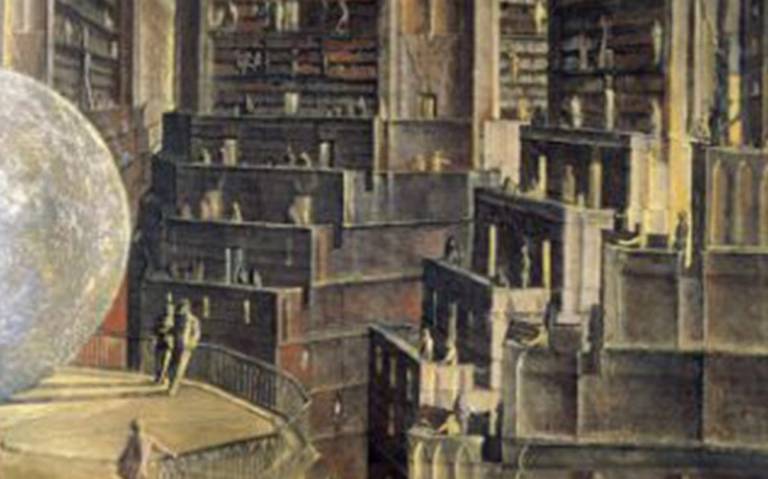EMERG ONLINE: Libraries & Museums in Early Modern England
03 March 2021, 5:00 pm–6:30 pm

This meeting of the English Department’s Early Modern English Reading Group will consider the foundation and development of libraries and museums in early modern England, and further afield. We will discuss the various ways in which early modern readers organised their books, and the kinds of spaces in which they worked and studied; we will also consider the porous boundary between libraries and exhibition spaces, and ask whether the early modern period believed there to be a distinct boundary between the spaces it called ‘libraries’, and those it called ‘museums’.
Event Information
Open to
- All
Organiser
-
Early Modern Exchanges
This thinker observed that all the books, no matter how diverse they might be, are made up of the same elements: the space, the period, the comma, the twenty-two letters of the alphabet. He also alleged a fact which travellers have confirmed: In the vast Library there are no two identical books. From these two incontrovertible premises he deduced that the Library is total and that its shelves register all the possible combinations of the twenty-odd orthographical symbols (a number which, though extremely vast, is not infinite): Everything: the minutely detailed history of the future, the archangels' autobiographies, the faithful catalogues of the Library, thousands and thousands of false catalogues, the demonstration of the fallacy of those catalogues, the demonstration of the fallacy of the true catalogue, the Gnostic gospel of Basilides, the commentary on that gospel, the commentary on the commentary on that gospel, the true story of your death, the translation of every book in all languages, the interpolations of every book in all books. (Jorge Luis Borges, ‘The Library of Babel’, 1941)
In his 1941 story ‘The Library of Babel’, Borges imagines a library so vast that it can contain all possible books within its walls. The ambitions held by early modern writers, architects, educators, and scholars scarcely fell short of Borges’s vision – for the thinkers of sixteenth and seventeenth century Europe, the library was a space which could overlap with the museum, and a space which could extend from indoor spaces into gardens and colonnades.
This meeting of the English Department’s Early Modern English Reading Group will consider the foundation and development of libraries and museums in early modern England, and further afield. We will discuss the various ways in which early modern readers organised their books, and the kinds of spaces in which they worked and studied; we will also consider the porous boundary between libraries and exhibition spaces, and ask whether the early modern period believed there to be a distinct boundary between the spaces it called ‘libraries’, and those it called ‘museums’. Authors discussed include William Drummond, Abraham Cowley, John Evelyn, Edmund Spenser, and Samuel Daniel.
This event will run via Zoom - the link will be circulated via the EMERG mailing list. For more information, and to be added to EMERG’s mailing list, please contact Fraser McIlwraith (fraser.mcilwraith.15@ucl.ac.uk) and Kate Kinley (catherine.kinley.19@ucl.ac.uk). We are keen to accept submissions in advance in advance of our meetings, so if you would like to recommend an extract from a Renaissance text, please contact us!
 Close
Close

